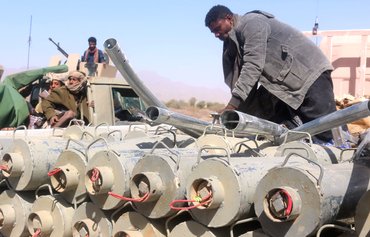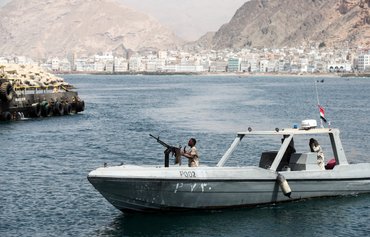The Houthis (Ansarallah) are in possession of new weapons similar to those produced in Iran, according to a recent report, confirming the Iranian regime's intervention in the Yemen war to fulfill its own agenda, experts say.
The evidence available in the UN report, obtained by AFP on January 31st, constitutes a potential violation of a UN arms embargo.
Some of the new weapons, which the Houthis have possessed since 2019, "have technical characteristics similar to arms manufactured in the Islamic Republic of Iran", said the report, which was compiled by a panel of UN experts tasked with monitoring the embargo.
The panel did not say whether the weapons were delivered to the Houthis directly by the Iranian government, which has repeatedly denied sending them arms.
"In addition to the previously known weapon systems, they used a new type of Delta-design uncrewed aerial vehicle and a new model of land attack cruise missile," the document said.
The weapons, as well as commercially available parts constituting some of the weapons, potentially violated the embargo, according to the document.
The experts separately added that the Houthis' claim that they carried out the attacks against two key Saudi oil installations on September 14th was "unlikely".
Several countries, including the US, have ruled out the Houthis' ability to conduct such an attack, and instead accused Iran, which has denied involvement.
The panel additionally said it had identified a "Houthi network involved in the repression of women who oppose the Houthis, including through the use of sexual violence".
"Violations of international humanitarian law and international human rights law continued to be widely committed by all parties in Yemen with impunity," the report said.
Smuggling routes
The Houthis obtain weapons from the Iranian regime via smuggling routes that it uses to move weapons, drugs and money to the militia, political analyst Waddah al-Jalil told Al-Mashareq.
"Iran is also sending military and security experts who are providing technical and logistical support to the Houthis," he said.
At the start of the war in 2015, the Houthis did not possess advanced rockets or drones, he said, "but a few years into the war and with the continued Iranian intervention through smuggling, the Houthis acquired advanced weapons, enabling them to make strategic gains".
The smuggling of arms to the Houthis is done via two routes in eastern Yemen on the border with Oman, al-Jalil said.
Secret cells then help transport the weapons through areas controlled by the legitimate government and deliver them to the Houthis, he added.
The government and Arab Coalition have thwarted several of these smuggling attempts, but "it is difficult to stop all of them as they go through vast desert areas, mountain ranges and hills extending from the Omani border to al-Jawf and Sanaa provinces", he said.
Oman has been a stalwart supporter of efforts to bring Yemen's warring parties to the negotiating table, but experts say it is possible that smugglers have been operating in remote areas without the sultanate's knowledge or consent.
Violating arms embargo
Meanwhile, Abaad Centre for Studies and Research director Abdul Salam Mohammed said units 190 and 400 of the Islamic Revolutionary Guard Corps Quds Force (IRGC-QF) are overseeing the smuggling and delivery of weapons in parts that are assembled after they reach Houthi-controlled areas.
"Iran has a smuggling route via the Mediterranean Sea and another via the Indian Ocean which is used to get the weapons to Oman's borders or the Horn of Africa, from where they are carried aboard small boats to Yemeni islands," he said.
"Once there, Iranian experts assemble them and train the Houthis on how to use them," he added.
All rockets and drones used by the Houthis are similar to those made in Iran, he said, including the Qasef, which is similar to Iranian-made Ababil; al-Najim al-Thaqib, similar to Iran's Eqab; and Zelzal, which is used by both sides.
Iran has violated the arms embargo on Yemen and is trying to impose a new military reality that favours the Houthis and achieves the Iranian regime's goals in the region, Mohammed said.
"The Houthis were able to strike strategic targets of the Yemeni army and facilities in Saudi Arabia thanks to Iran-supplied smart weapons," he said.

![US Assistant Secretary of Near Eastern Affairs David Schenker (2nd-R) is shown reportedly Iranian weapons seized by Saudi forces from Yemen's Houthis, during a visit to a military base in al-Kharj in central Saudi Arabia, on September 5th, 2019. [Fayez Nureldine/AFP]](/cnmi_am/images/2020/02/05/22300-Yemen-Houthis-weapon-600_384.jpg)






